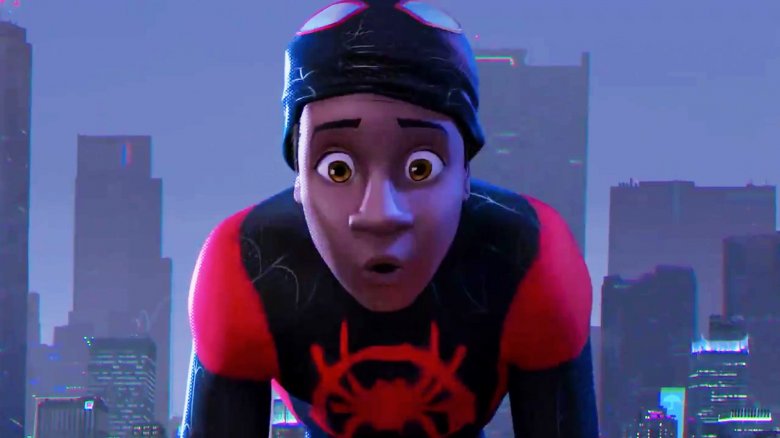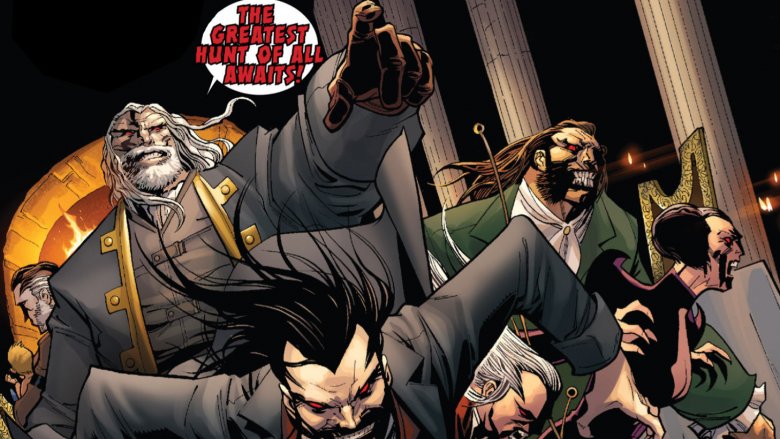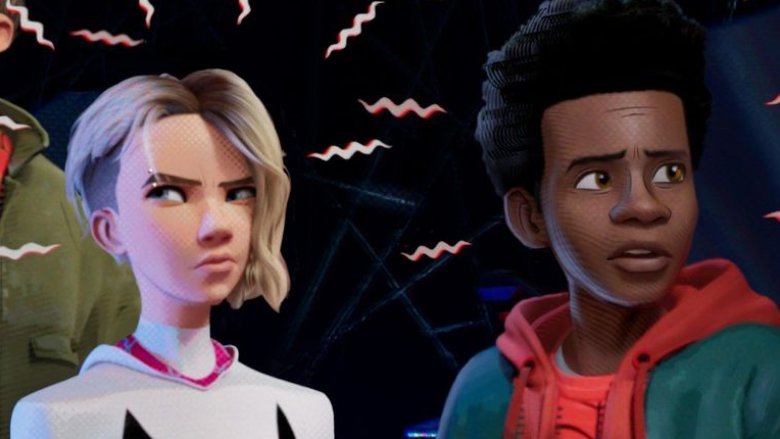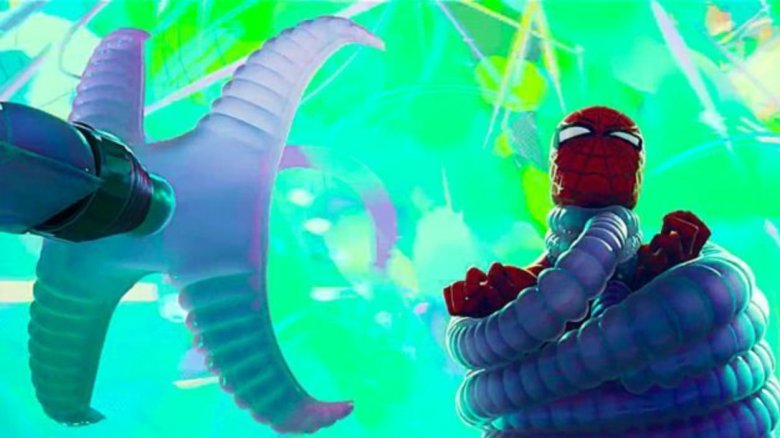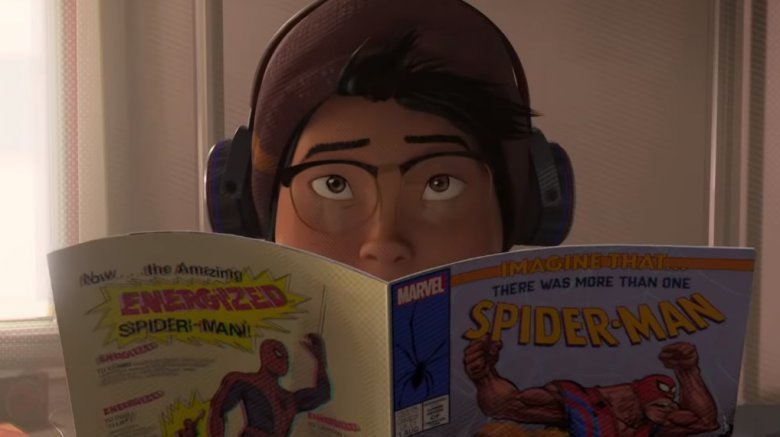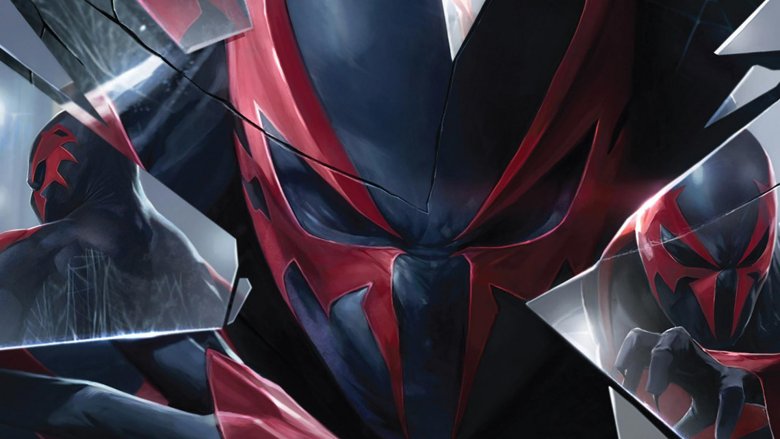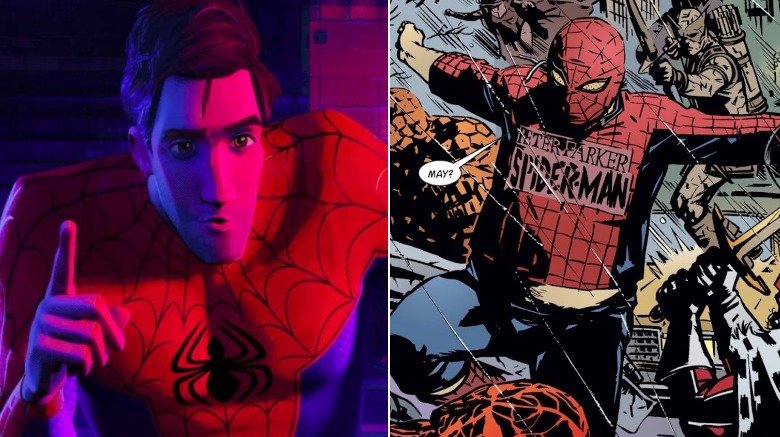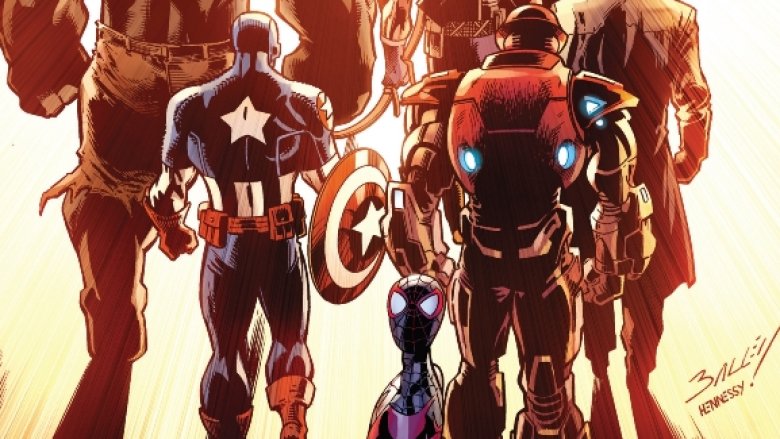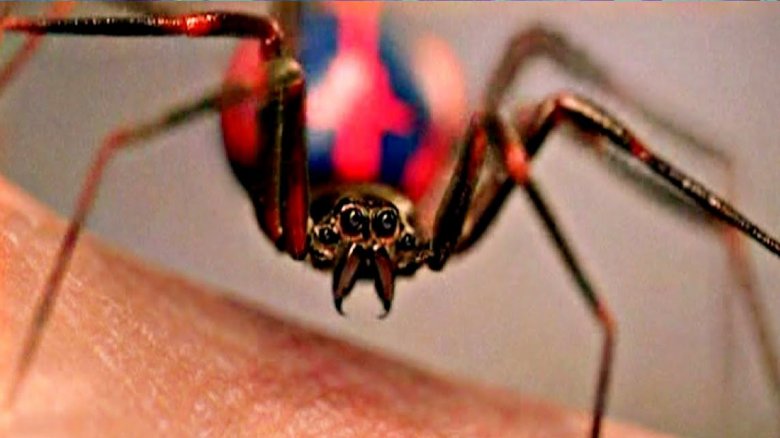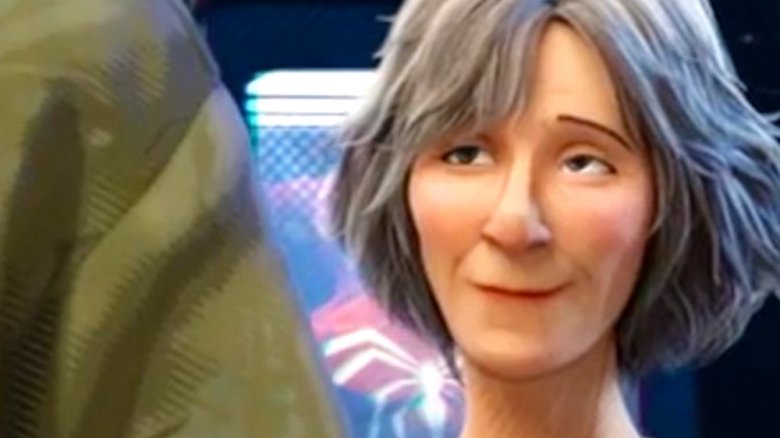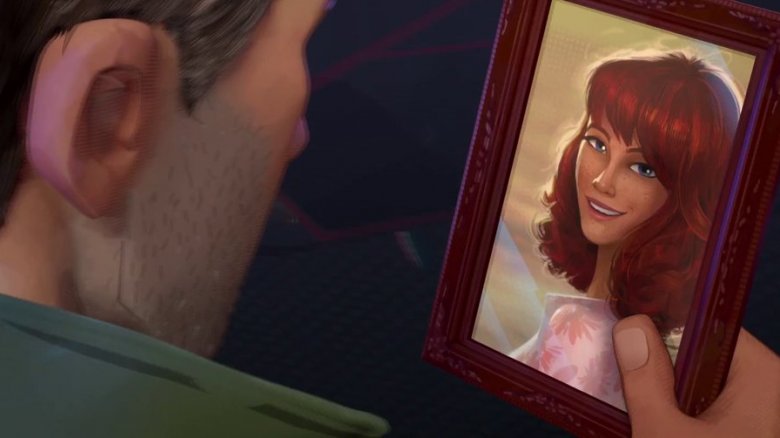Spider-Man: Into The Spider-Verse's Biggest Unanswered Questions
There wasn't much left unresolved by the end of Spider-Man: Into the Spider-Verse. Miles Morales (Shameik Moore) proved himself worthy of the mantle of Spider-Man, the visiting Spider-people returned to their respective realities, and all was right with the world — with a few worlds, actually.
Still, it's tough to walk out of the theater without at least a few questions, especially if you're familiar with the comics. There are a lot of differences between Into the Spider-Verse and its source material, but there were not-so-subtle hints in the film that some of the gaps between Into the Spider-Verse and the comics upon which it's based could be filled in future films.
We're also left wondering about the futures of a lot of these characters. The alternate reality aspect of the film helps to make an old franchise feel new, and as such we're not quite as sure as we otherwise might be what characters like Aunt May (Lily Tomlin) and Peter B. Parker (Jake Johnson) are going to do with their lives now that the status quo looks a lot different from what we're used to.
Whether it's about the differences between comic book panels and movie screens, second-guessing the strange behavior of certain characters, or just asking what's going going to happen next, here are our biggest unanswered questions about Spider-Man: Into the Spider-Verse.
Are the Inheritors out there?
The most glaring absence in Spider-Man: Into the Spider-Verse was that of the Inheritors, a family of sadistic vampires who prey on the life-force of heroes across Marvel's multiverse. They specifically target heroes who act as animal "Totems," and their favorite meal is spider. In the 2014 Marvel Comics event Spider-Verse — upon which Spider-Man: Into the Spider-Verse is loosely based — the merciless hunters attempt to wipe out all of the multiverse's Spider Totems.
There are a couple of very good reasons for the film to veer away from the comic. First, Spider-Verse featured an entire army of alternate reality spider folk, and that might've been too much for the first film in the Miles Morales franchise. Second, and way more importantly, Spider-Verse is easily one of the most violent Spider-Man stories you could hope to find. The Inheritors are good at their jobs, and while they're eventually defeated, the story had a high body count. Sony was understandably looking for more family-friendly stuff.
But there were signs in Into the Spider-Verse that the Inheritors are around. In scenes involving the super-collider, Miles saw a seemingly infinite spiderweb stretching between realities. This is the Web of Life and Destiny which was an important aspect of Spider-Verse. If the Web is in the films, then could the Inheritors be there as well? If so, the filmmakers likely won't let them be quite as brutal, but watered-down versions could threaten Miles and his reality-hopping allies.
Why are they pushing their luck?
Spider-Man: Into the Spider-Verse ends with Miles presumably being summoned into the home reality of Spider-Gwen (Hailee Steinfeld). We don't actually see her, but we hear her voice and see some of the reality-warping effects. We also don't see Miles agree to join her. But by the grin on his face, it seems pretty clear he's eager to see her. Assuming he does go to visit Gwen, it's tough to not wonder what either of them think they're doing.
One of the reasons Miles' new Spider-themed buddies are so eager to get back to their home realities is that being in Miles' reality is killing them. Soon after Peter B. Parker arrives and meets Miles, we see that his body isn't reacting well to being in a parallel universe and his meeting with Olivia Octavius (Kathryn Hahn) confirms he doesn't have long to live if he doesn't get home.
So why is Gwen bringing Miles into her reality when she knows it could kill him? Why is he agreeing (assuming he does) to go? Is it just their mutual attraction shouting down their better judgment? Not to mention, how can Gwen now just causally peek into Miles' reality and say hey?
Olivia or Otto?
One of the bigger surprises of Into the Spider-Verse was the identity of what initially appears to be a harmless scientist. In fact, we first see her in an educational film at Miles' school. When Miles and Peter B. Parker run into Olivia Octavius in the flesh, we learn that this reality's Dock Ock is a woman.
What's particularly interesting about the filmmaker's choice to gender-swap Doc Ock is what it could mean for future films, assuming we're destined to meet even more alternate reality spider heroes. One of the more important members of the spider army in the comic book Spider-Verse was the so-called Superior Spider-Man — Peter Parker's body, but with the invasive mind of Otto Octavius.
A version of Spider-Man with the mind of a supervillain would have wonderful potential in an Into the Spider-Verse sequel, but with the gender-swapping of Dock Ock, it brings up the question of whether or not the Superior Spider-Man would likewise be a woman — a Superior Spider-Woman. And how might that manifest? Olivia Octavius taking over the body of Spider-woman, or a female Doc Ock taking over a male Spider-Man?
A little too revealing, Miles?
At the end of the film, we get a little montage in which we see the newly confident Miles Morales Spider-Man finding more balance in his new life. One of the things we see him do is reveal his identity to his roommate at his private school dorm — a character we don't learn the name of and never even hear speak. Considering all the people he doesn't unveil to — including his father — it's a mystery why he unmasked for this dork.
Earlier in the movie, the roommate catches Miles in their room along with all the alternate Spideys. So you could argue, "well, he already knew." Yeah, but not really. As soon as he sees all the spider people, he immediately passes out from shock. We don't even know if he noticed Miles' face alongside the black-clad Spider-Man Noir and the talking pig. The fact that he was literally reading a comic book about alternate reality Spider-Men could go a long way to building a hallucination explanation.
Who knows? Maybe Miles just figured since they share a room, it was easier to tell him than to constantly figure out ways to hide it from him. Still. He barely even tried. Miles would not handle interrogation well.
Why back to the beginning?
Like its live-action counterparts, Spider-Man: Into the Spider-Verse makes sure it's worth it for audiences to wait until after the credits. The post-credits scene features Miguel O'Hara (Oscar Isaac), a.k.a. the Spider-Man of the distant year 2099. Miguels' virtual assistant Lyla (Greta Lee) appears to have been monitoring what was going on with Miles and his alternate reality buddies. Miguel tells Lyla he's going to go back to "the beginning" and with some kind of futuristic tech, transports himself to Earth-67, the home of the Spider-Man cartoon of the '60s.
The scene that unravels between Miguel and the '60s cartoon Spider-Man (Jorma Taccone) is hilarious, but it begs the question of why Miguel bothered to do it at all. Even to someone from the future you would think stepping between parallel universes wouldn't be something to take lightly. Should we assume this was just a gag and not think too hard about it? Or is it possible that — like in the comic event Spider-Verse — the post-credits scene represents Spider-Man 2099's first effort to recruit a spider army to face a multi-dimensional threat along the lines of the Inheritors?
Earth X?
Alternate realities have become pretty commonplace in superhero comics. Almost all of the spider heroes in Into the Spider-Verse have appeared in parallel universes in the comics. Spider-Man Noir (Nicolas Cage) has enjoyed two comic book miniseries. Believe it or not, the ongoing comic Peter Porker, the Spectacular Spider-Ham ran for 17 issues in the mid-'80s. Both Miles Morales and Spider-Gwen have had their own ongoing series for some years now, and Peni Parker (Kimiko Glenn) debuted in the Spider-Verse comic event.
But Peter B. Parker — the overweight version of the character who pines uselessly for Mary Jane (Zoë Kravitz) – doesn't appear to be locked down to any specific alternate Spider-Man in the comics. At least, not at first. However, we're wondering — assuming he is meant to be a pre-existing alternate reality Spider-Man — if he's meant to be the Spidey of Earth X. The miniseries ran between 1999 and 2000, and showed readers a future where most of humanity had been mutated by the Inhumans' Terrigen Mists. Like Into the Spider-Verse's Peter B. Parker, Earth X's Spidey was overweight, aging, and reluctant to go back to web-swinging. He finally joined the fight in the last few issues of Earth X, barely being able to fit in his suit. Even fellow heroes like Captain America wondered out loud if the older and less fit Spider-Man shouldn't have stayed home and left things to the guys who still had washboard abs.
Ultimate End?
The Earth we see the most in Into the Spider-Verse – Miles' Earth — most closely resembles the reality inhabited by Marvel's now defunct Ultimate line of comics. Villains like Green Goblin (Jorma Taccone) and Scorpion (Joaquin Cosio) more closely resemble the Ultimate versions of the characters, and of course, Miles Morales first appeared in the Ultimate comics — specifically in the miniseries Ultimate Fallout.
But Miles didn't stay in the Ultimate universe. As part of the line-wide event Secret Wars, the Ultimate universe was destroyed. Unlike most of the heroes from his world, Miles had the privilege to become a part of the prime Marvel Earth, a.k.a. Earth-616.
So what, if anything, could this mean for the Spider-Man of Into the Spider-Verse? On one hand, there's no reason any follow-up films have to mirror the comics in any specific ways (other than, you know, the dude being named Spider-Man and stuff like that). On the other, it seems strange that we now have a popular and lucrative Marvel franchise set in a world that no longer exists in the comics.
Could this mean that Miles' Earth is destined for annihilation on the big screen? Or, alternatively, could it mean Marvel Comics could see the return of the Ultimate universe in the panels?
Where did the spider come from?
One of the most subtle mysteries of Spider-Man: Into the Spider-Verse isn't how Miles Morales becomes Spider-Man, but why.
Miles is bitten by a radioactive spider while he's tagging a wall with graffiti in an abandoned part of NYC's subway tunnels with his uncle Aaron (Mahershala Ali). We see the spider going through the same phasing the alternate Spideys experience after coming to Miles' world, suggesting the spider who bites Miles is also from an alternate Earth.
But how does the spider get there, and when? The super-collider event that brings the alternate Spideys to Miles' world happens after Miles is bitten by the spider. It's possible that, like Gwen Stacy, the spider traveled not only across dimensions but into the past (Gwen says when she was pulled into Miles' world, it sent her "into last week"). If so, then the fact that it bit Miles suggests something a bit more than an accident. It feels more like providence — like the spider chose Miles specifically because it sensed something about him. Perhaps something was guiding the spider along the Web of Life and Destiny, looking for another warrior for the battle that was to come.
Will Aunt May help Miles?
When Peter B., Miles, and Gwen met Aunt May, she wasn't very surprised. She knew immediately that Peter B. Parker was from another dimension, and we soon learn this is because she's already playing host to Spider-Man Noir, SP//dr, and Spider-Ham (John Mulaney). The original Spider-Man (Chris Pine) of Miles' world — before he was beaten to death by the Kingpin (Liev Schreiber) — kept his own Spider-Cave beneath May's property, accessible through the shack in her backyard. The various Spider guys all come together for the first time in that now sacred space.
With all the alternate Spideys back in their home realities and her own nephew gone to the Great Beyond, will May continue to help Miles now that he's taken up the mantle of Spider-Man? After all, she has access to his Spider-Cave and all its cool suits. Miles doesn't have organic webshooters as far as we know and doesn't have any way to make the stuff on his own. At the very least, someone's probably going to have to teach him how to make it and it seems likely the late Parker kept a supply in his underground base. Not to mention that with the original Spider-Man of Miles' world gone, May could be the only person to act as Miles' mentor. On the other hand, for May it could help to fill the void her nephew left when he died.
Will Peter B. Parker reunite with Mary Jane?
The last we see of Peter B. Parker, he's back on his own Earth with a bouquet of flowers, hoping to reconcile with his now ex-wife Mary Jane Watson. When she opens the door, she seems happy to see him, but that doesn't necessarily mean anything.
Peter and Mary Jane — likely in any reality — have a long, stormy history, and there's no guarantee Mary Jane will take him back. Even if she does, there are plenty of reasons to think it's only a matter of time before they split again. Part of the tragedy that is the on-again/off-again nature of their relationship is that Pete's identity as Spider-Man is part of why Mary Jane loves him, and it's also the biggest threat to their relationship when they're together. You might almost think that Parker might have better luck with Mary Jane if he stayed the lazy, less-than-honest slob we meet toward the beginning of Into the Spider-Verse. At least then Mary Jane wouldn't have to worry about him every time he went on his web-swinging patrols. Then again, the pizza receptacle Parker turned into after his break-up with MJ is not the guy she fell in love with.
So who knows? There may be no happily-ever-after for these two.
